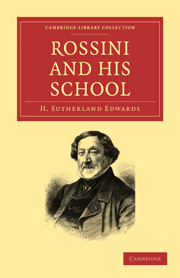Book contents
- Frontmatter
- Contents
- CHAP. I ROSSINI'S CHILDHOOD AND YOUTH
- CHAP. II LA PIETEA DEL PARAGONE
- CHAP. III ITALIAN OPERA UNTIL THE TIME OF ROSSINI
- CHAP. IV TANCREDI
- CHAP. V OPERATIC CUSTOMS IN ROSSINI'S TIME
- CHAP. VI ROSSINI AT NAPLES
- CHAP. VII PREPARATIONS FOR THE BARBER
- CHAP. VIII IL BARBIERE
- CHAP. IX ROSSINI AND THE COMIC IN MUSIC
- CHAP. X FROM OTELLO TO SEMIKAMIDE
- CHAP. XI ROSSINI ON HIS TRAVELS
- CHAP. XII DONIZETTI
- CHAP. XIII VERDI
- LIST OF ROSSINI'S PUBLISHED WORKS
CHAP. V - OPERATIC CUSTOMS IN ROSSINI'S TIME
Published online by Cambridge University Press: 29 August 2010
- Frontmatter
- Contents
- CHAP. I ROSSINI'S CHILDHOOD AND YOUTH
- CHAP. II LA PIETEA DEL PARAGONE
- CHAP. III ITALIAN OPERA UNTIL THE TIME OF ROSSINI
- CHAP. IV TANCREDI
- CHAP. V OPERATIC CUSTOMS IN ROSSINI'S TIME
- CHAP. VI ROSSINI AT NAPLES
- CHAP. VII PREPARATIONS FOR THE BARBER
- CHAP. VIII IL BARBIERE
- CHAP. IX ROSSINI AND THE COMIC IN MUSIC
- CHAP. X FROM OTELLO TO SEMIKAMIDE
- CHAP. XI ROSSINI ON HIS TRAVELS
- CHAP. XII DONIZETTI
- CHAP. XIII VERDI
- LIST OF ROSSINI'S PUBLISHED WORKS
Summary
The year after the production of Tancredi, Rossini, in 1814, brought out Aureliano, which was not successful. It contained, however, at least one piece of music which the composer, with due regard to economy, was determined not to waste. This was the introduction itself, borrowed from Ciro in Bdbilonia, which, when Rossini afterwards adapted its melody to words written for Count Almaviva in the Barber of Seville, obtained lasting success in the form of the charming cavatina “Ecco ridente il cielo.”
The overture, moreover, to Aureliano in Palmira, after serving as instrumental introduction to Elisabetta, produced a year later at Naples, found ultimately a permanent position as musical preface to the Barber of Seville. The failure of Aureliano in Palmira, which Rossini attributed in a great measure to the liberties taken with the music by at least one of the performers, caused him to adopt the practice of writing for the singers the very notes he intended them to sing. Strange innovation! But, until Rossini's time, the vocalists were really the composer's masters, and regarded his airs merely as so much canvas for embroidery.
To Rossini belongs the honour of having helped greatly to expel the sopranists from the operatic stage. The Church, with a view to soprano voices in choirs, from which women were excluded, had introduced them; and ultimately the Church pronounced against them.
- Type
- Chapter
- Information
- Rossini and his School , pp. 33 - 42Publisher: Cambridge University PressPrint publication year: 2009First published in: 1881



